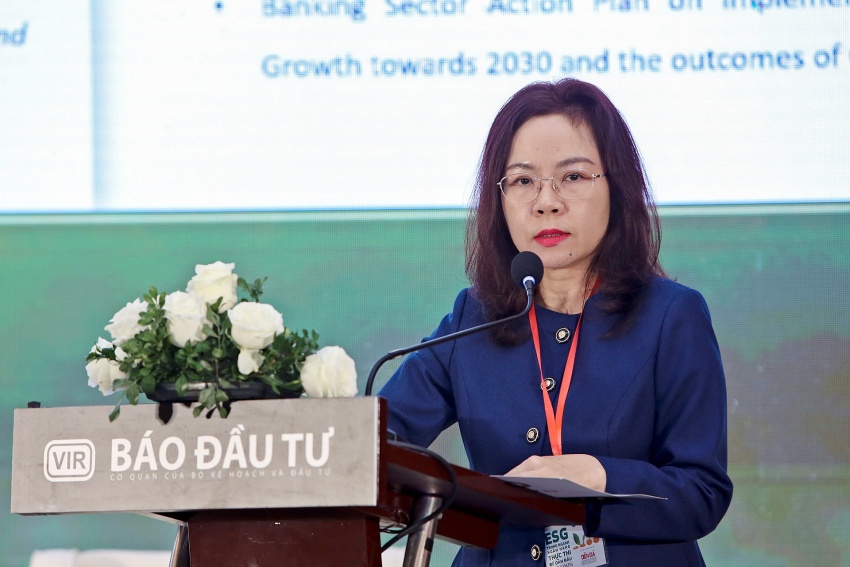Banking sector contributes to ESG, green growth, and sustainable development
Implementing environmental, social, and governance (ESG) practices is a core, cross-cutting task for the banking sector.
At a conference themed "ESG in banking: Leading through implementation" on November 19, Ha Thu Giang, director general of the Department of Credit for Economic Sectors at the State Bank of Vietnam (SBV), affirmed the key role of the banking system in the promotion of ESG, green growth, and sustainable development.
 |
As the state agency responsible for monetary policy, banking operations, and foreign exchange management, the SBV has actively implemented a comprehensive range of measures to fulfill the directives of the Party and government on green growth and sustainable development.
The SBV has managed monetary policy tools and measures in a flexible and synchronised manner to control inflation, contribute to macroeconomic stability, and maintain monetary market stability.
The SBV has issued various documents to implement environmental and social risk management in credit activities, including a handbook for assessing environmental and social risks in credit activities across 15 high-risk economic sectors; a green banking development scheme; the Banking Sector Action Plan on Implementing the 2030 Agenda for Sustainable Development; a circular on managing environmental risks in credit activities; and the Banking Sector Action Plan on Implementing the National Strategy on Green Growth towards 2030.
The SBV has directed credit institutions to implement various programmes that benefit the environment, and social credit programmes for low-income households, contributing to inclusive green growth goals. They include credit policies for rural agricultural development, a loan programme for linking production, processing, and consumption of high-quality, low-emission rice in the Mekong Delta region, and credit policies at the Vietnam Bank for Social Policies for poor households and policy beneficiaries.
The SBV has actively participated in domestic and international seminars and forums related to ESG, green finance, and sustainable banking. This involvement allows it to learn from and share experiences in implementing ESG practices, green credit, and sustainable banking.
"Credit institutions have acknowledged the importance of ESG practices in banking operations. They have proactively researched, developed, and enhanced their ESG systems in a comprehensive manner," Giang emphasised.
They are integrating environmental and social commitments into business strategies and action plans, while studying ESG regulations, and international standards to develop internal guidelines for managing environmental and social risks. They are also improving organisational structures by establishing dedicated ESG units, engaging in international cooperation, mobilising resources to prioritise funding for green projects and climate initiatives, developing green credit programmes and products, and disclosing information to ensure transparency.
Additionally, digital transformation efforts have been accelerated to improve access to banking services and promote financial inclusion. Credit institutions have strengthened staff capacity in ESG practices, environmental and social risk management, and the development of sustainable financial products. Internal initiatives promoting sustainable operations have been enhanced. Efforts have also been made to educate clients and integrate related strategies into their core business activities.
By September 30 this year, 50 credit institutions had green credit balances with an outstanding balance of over VND665 trillion ($27 billion), an increase of 7.11 per cent compared to the end of 2023, accounting for over 4.5 per cent of total outstanding loans of the economy, mainly focusing on renewable energy, clean energy (over 43 per cent), and green agriculture (over 30 per cent), according to the SBV.
Credit institutions have strengthened the management of environment and social risks in credit activities. Outstanding credit assessed for environment and social risks reach VND3.28 quadrillion ($134 billion), accounting for more than 22.33 per cent of the total outstanding loans of the economy, an increase of 15.62 per cent compared to the end of 2023.
Giang said to promote ESG practices, green banking operations, and move towards sustainable development goals, the SBV will continue to implement tasks like continuing to monitor, guide, and promptly remove difficulties in the implementation of government guidelines. The bank will also guide credit institutions to issue green credit and report on its implementation after the prime minister issues the National Green Taxonomy.
"The SBV will support and facilitate credit institutions to participate in international cooperation activities, thereby enhancing resource mobilisation, contributing to the implementation of the National Strategy on Green Growth and promoting ESG practices in Vietnam," she highlighted.
Participating in domestic and international forums on green credit, green banking, ESG practices, and sustainable growth is also essential, in addition to promoting communication and training to raise awareness and quality of human resources in the banking industry to meet the implementation requirements of ESG practices as well as international standards in sustainable development, Giang recommended.
 | Factors to take into account for ESG implementation The COP29 summit, starting November 11, is pivotal for addressing global climate challenges. From our perspective, such international gatherings are crucial as they lay the groundwork for future policies and agreements that influence businesses worldwide, including in Vietnam. |
 | ESG implementation spurs bank progress The Vietnamese banking sector recognises its role in leading environmental, social, and governance efforts, driving sustainable investment flows, and setting new standards for its clients. |
 | ESG - Prerequisites for sustainable business growth In the first episode of Greennovate's second season, Jakub Kudrna, chief strategy officer and chairman of Home Credit Vietnam’s Environmental, Social, and Governance (ESG) Steering Group, shared his insights on sustainability in consumer finance. |
 | VIR to host seminar on ESG integration As the lifeblood of the economy, the banking sector is playing a pivotal role in pioneering Environmental, Social, and Governance (ESG) standards while supporting Vietnam’s bold reforms on green and sustainable growth. |
What the stars mean:
★ Poor ★ ★ Promising ★★★ Good ★★★★ Very good ★★★★★ Exceptional
 Tag:
Tag:
Related Contents
Latest News
More News
- Cashless payments hit 28 times GDP in 2025 (February 04, 2026 | 18:09)
- SSIAM and DBJ launch Japan Vietnam Capital Fund (February 04, 2026 | 15:57)
- Banks target stronger profits, credit growth in 2026 (February 04, 2026 | 15:43)
- Vietnam on path to investment-grade rating (February 03, 2026 | 13:07)
- Consumer finance sector posts sharp profit growth (February 03, 2026 | 13:05)
- Insurance market building the next chapter of protection (February 02, 2026 | 11:16)
- NAB Innovation Centre underscores Vietnam’s appeal for tech investment (January 30, 2026 | 11:16)
- Vietnam strengthens public debt management with World Bank and IMF (January 30, 2026 | 11:00)
- Corporate bond market poised for stronger growth cycle (January 28, 2026 | 17:13)
- Vietnam's IPO market on recovery trajectory (January 28, 2026 | 17:04)




























 Mobile Version
Mobile Version